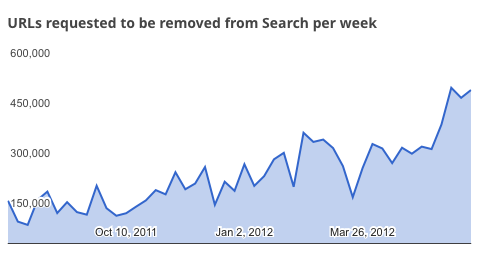Most Censorship And Content Takedown Requests Come From US, Says Google
Google has released data from its latest Transparency Report covering censorship and content removal requests. The report features separate presentations of copyright-based removal requests and government requests. Google began publishing this data about two years go. The report is updated regularly; however government censorship and removal requests are updated every six months. The number of […]
 Google has released data from its latest Transparency Report covering censorship and content removal requests. The report features separate presentations of copyright-based removal requests and government requests. Google began publishing this data about two years go.
Google has released data from its latest Transparency Report covering censorship and content removal requests. The report features separate presentations of copyright-based removal requests and government requests. Google began publishing this data about two years go.
The report is updated regularly; however government censorship and removal requests are updated every six months. The number of copyright removal requests has grown dramatically over the past six months. Most of these requests involve file sharing domains.
Most of the takedown requests are coming from entertainment companies or trade groups representing them. However the top copyright owner requesting takedowns was Microsoft with more than 2 million URLs requested to be removed in the past year and almost 500,000 in the past month.
In the government requests category, Google said that the US is the country with the most activity. Some of these requests are in the form of court orders, while others from various government and law-enforcement entities. Overall there were more than 6,000 content items targeted in just under 200 removal requests in the US during the past six months.
Google actually complied with those requests a little over 40 percent of the time. That includes court orders, interestingly.
Germany, Brazil, Australia, Argentina, Canada, Turkey and the UK were other countries with considerable content removal activity. Driven by local laws, in some cases Google’s compliance was much greater than in others. An article in the Wall Street Journal goes into some of these legal differences between states and governments and provides some examples.
In addition to the overview and summary information Google maintains the raw data detailing the dates, parties and reasons provided for the removal requests. Google also discusses the chilling effects of these removal requests in several instances. In a blog post Google pointed out that political speech is often being targeted in government removal requests:
And just like every other time before, we’ve been asked to take down political speech. It’s alarming not only because free expression is at risk, but because some of these requests come from countries you might not suspect—Western democracies not typically associated with censorship.
For example, in the second half of last year, Spanish regulators asked us to remove 270 search results that linked to blogs and articles in newspapers referencing individuals and public figures, including mayors and public prosecutors. In Poland, we received a request from a public institution to remove links to a site that criticized it. We didn’t comply with either of these requests.
It’s significant, indeed important, that Google provides this information so that the public, third parties and watchdog groups can take governments and corporations to task where such requests are unreasonable, overboard or would attempt to stifle public discourse and debate.
Contributing authors are invited to create content for Search Engine Land and are chosen for their expertise and contribution to the search community. Our contributors work under the oversight of the editorial staff and contributions are checked for quality and relevance to our readers. The opinions they express are their own.
Related stories
New on Search Engine Land

